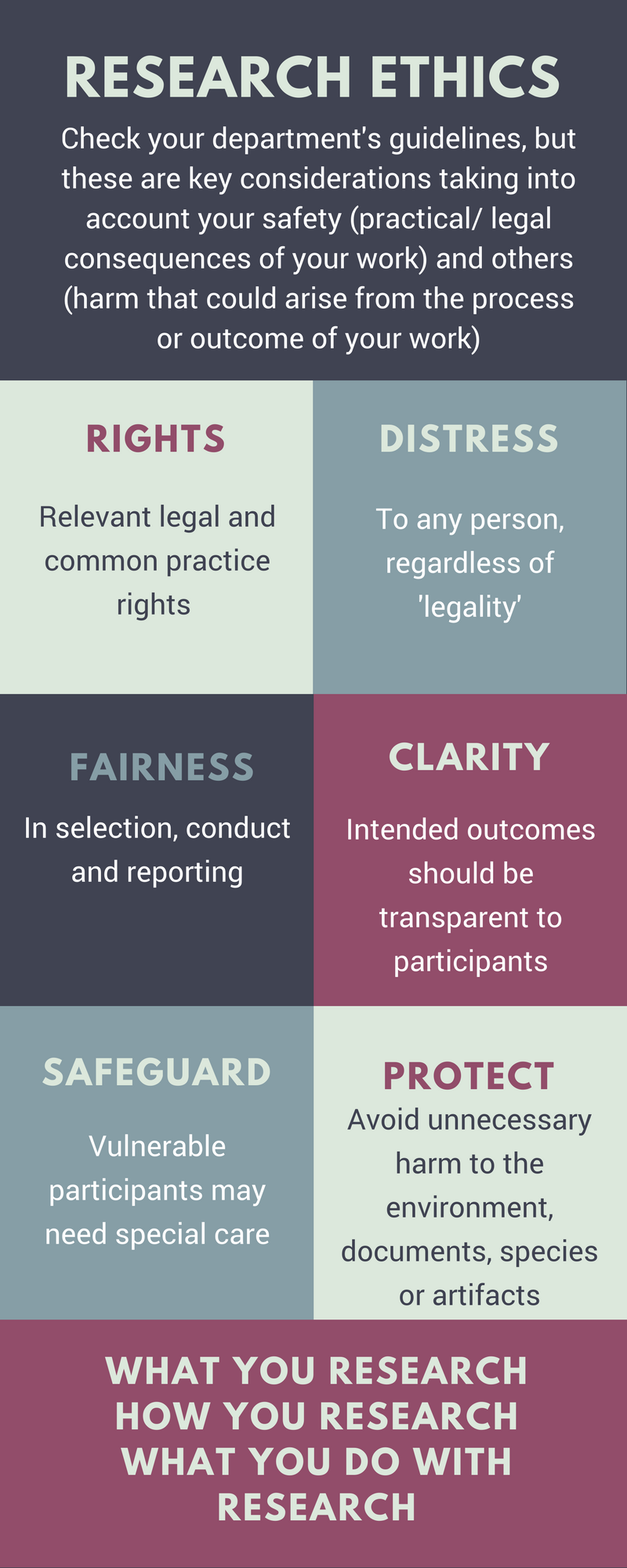The ethical considerations behind a PhD will vary enormously depending on your topic, methodology and fieldwork / data collection plans. The range of things you will have to plan for in your research cover things that are important to keep you safe, to keep those you work with safe, to prevent abuse and to maintain high standards of integrity. We are all familiar with historic examples of research participants being abused or exploited during experiments into health or psychology, for example.
Your institution will have formal structures and processes to ensure ethical rigor in research that you must comply with. Similarly, your department is likely to have more specialised guidelines relevant to your field of study. It is important to familiarise yourself with these structures early on in the process of your PhD.
Many academic conferences, workshops and summer schools hold specific training or discussion about research ethics. Similarly, different disciplines will have their own sets of ethical conventions. A good place to look for a basic overview is at the National Research Ethics Society.
Have a look at the infographic below to familiarise yourself with the broad range of issues that you will be required to think about in designing the ethical framework for your research. The importance of these issues can’t be underestimated both in terms of ensuring the feasibility of your research project and in terms of contributing to holding scientific research to high ethical standards.
Although is likely to be one of the least exciting elements of your research, referencing is a key ethical consideration. Making sure any information from literature, your own data or other people's data is accurately and comprehensively referenced is incredibly difficult unless you begin keeping meticulous records early on in your research. Using basic referencing software like zotero or mendelay can help you with this. However, if you are producing lots of data you also need to decide at the outset of your work what system you will use to code and categorise data. If you are producing any data that needs to be anonymised this is even more important. Finally, you need to think carefully if you wish to cite any unpublished information, especially if it not publically available. Having access is not the same as having permission to publish someone else's intellectual property.
You will also need to be transparent if any vested interest or bias exists in your work:
- Financial gain
- Personal interests (emotional or ideological investment)
- Personal connections
- Professional reputation
- If, for example, you have a commercial sponsor you must state this at every stage of the process from proposal, to fieldwork approval to write up.
You can read much more comprehensively about some of these issues in:
- Stella Cottrell's 2014, ‘Dissertations and Project Reports: A Step by Step Guide’, Basingstoke, Palgrave Macmillan (Falmouth University e-book) (University of Exeter e-book)
- Paul Oliver's 'The student's guide to research ethics' (Falmouth University e-book) (University of Exeter e-book)
You will find lots of interesting information online about research ethics in your field, here are a two places you could start for general information:
Hannah Farrimond writes for the Guardian about 'How to make sure your research is ethical?'
Nancy Walton's 'research ethics' blog reflects on human-subjects research ethics
